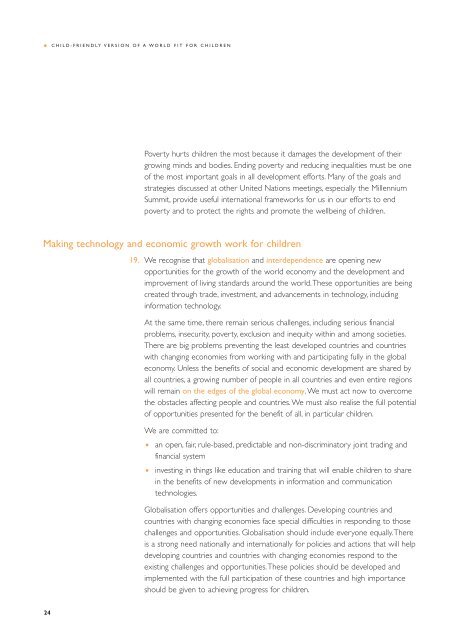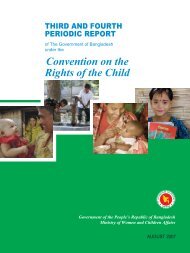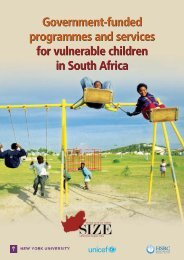Child-Friendly version of 'A World Fit for Children' - Unicef
Child-Friendly version of 'A World Fit for Children' - Unicef
Child-Friendly version of 'A World Fit for Children' - Unicef
You also want an ePaper? Increase the reach of your titles
YUMPU automatically turns print PDFs into web optimized ePapers that Google loves.
●<br />
CHILD-FRIENDLY VERSION OF A WORLD FIT FOR CHILDREN<br />
Poverty hurts children the most because it damages the development <strong>of</strong> their<br />
growing minds and bodies. Ending poverty and reducing inequalities must be one<br />
<strong>of</strong> the most important goals in all development ef<strong>for</strong>ts. Many <strong>of</strong> the goals and<br />
strategies discussed at other United Nations meetings, especially the Millennium<br />
Summit, provide useful international frameworks <strong>for</strong> us in our ef<strong>for</strong>ts to end<br />
poverty and to protect the rights and promote the wellbeing <strong>of</strong> children.<br />
Making technology and economic growth work <strong>for</strong> children<br />
19. We recognise that globalisation and interdependence are opening new<br />
opportunities <strong>for</strong> the growth <strong>of</strong> the world economy and the development and<br />
improvement <strong>of</strong> living standards around the world.These opportunities are being<br />
created through trade, investment, and advancements in technology, including<br />
in<strong>for</strong>mation technology.<br />
At the same time, there remain serious challenges, including serious financial<br />
problems, insecurity, poverty, exclusion and inequity within and among societies.<br />
There are big problems preventing the least developed countries and countries<br />
with changing economies from working with and participating fully in the global<br />
economy. Unless the benefits <strong>of</strong> social and economic development are shared by<br />
all countries, a growing number <strong>of</strong> people in all countries and even entire regions<br />
will remain on the edges <strong>of</strong> the global economy.We must act now to overcome<br />
the obstacles affecting people and countries. We must also realise the full potential<br />
<strong>of</strong> opportunities presented <strong>for</strong> the benefit <strong>of</strong> all, in particular children.<br />
We are committed to:<br />
• an open, fair, rule-based, predictable and non-discriminatory joint trading and<br />
financial system<br />
• investing in things like education and training that will enable children to share<br />
in the benefits <strong>of</strong> new developments in in<strong>for</strong>mation and communication<br />
technologies.<br />
Globalisation <strong>of</strong>fers opportunities and challenges. Developing countries and<br />
countries with changing economies face special difficulties in responding to those<br />
challenges and opportunities. Globalisation should include everyone equally.There<br />
is a strong need nationally and internationally <strong>for</strong> policies and actions that will help<br />
developing countries and countries with changing economies respond to the<br />
existing challenges and opportunities.These policies should be developed and<br />
implemented with the full participation <strong>of</strong> these countries and high importance<br />
should be given to achieving progress <strong>for</strong> children.<br />
24
















